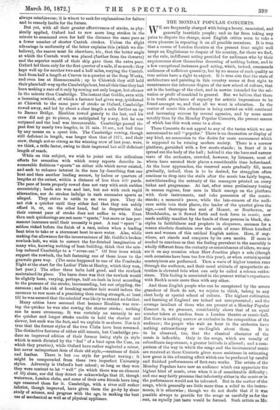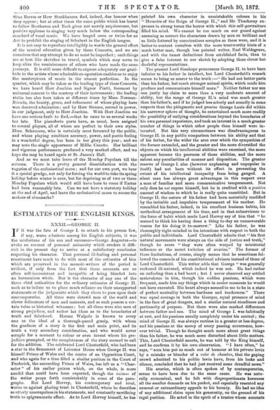THE MONDAY POPULAR CONCERTS.
WE are frequently charged with being a heavy, unmusical, and generally inartistic people ; and so far from taking any pains to dispute the charge, most English critics seem to take a -
stern pleasure in repeating it on all possible occasions. It is true that a course of London theatres at the present time might well tempt an Englishman to despair of his country, for there we find, as the rule, indifferent acting provided for audiences who by their acquiescence show themselves deserving of nothing better, and in a few exceptional instances good acting, which, indeed, commands audiences of sufficient quantity, but by no means of such quality as true artists have a right to expect. It is true also that the state of architecture and painting in this country seems at first sight to countenance the inhuman dogma of the new school of culture, that art is the heritage of the elect, and in nowise intended for the sal- vation or profit of mankind in general. But we believe that there is in truth abundance of capacity for artistic impressions to be found amongst us, and that all we want is education. In the matter of music this education is being carried on with continual and increasing success by several agencies, and by none more notably than by the Monday Popular Concerts, the present season of which has this week come to a close.
These Concerts do not appeal to any of the tastes which we are accustomed to call "popular." There is no decoration or display of any kind, no concession to the desire for mere amusement which is supposed to be ruining modern society. There is a narrow platform, garnished with a few music-stands ; in front of it is spread out the body of the hall ; behind it rise the bare and narrow seats of the orchestra, crowded, however, by listeners, most of whom have secured their places a considerable time beforehand.
As the hour approaches, the reserved seats gradually fill, more gradually, indeed, than is to be desired, for stragglers often continue to drop into the stalls after the music has fairly begun, notwithstanding the entreaty of the managers printed on every ticket and programme. At last, after some preliminary tuning in unseen regions, four men in black emerge on the platform with their instruments, and take possession of the music- stands ; a moment's pause, while the late-comers of the audi- ence settle into their places, the leader of the quartet gives the sign,—and thereupon the soul of Mozart, or Beethoven, or Mendelssohn, as it flowed forth and took form in music, now made audibly manifest by the hands of these persons in black, dis- ciples in faithfulness and prophets in eloquence, assumes for a season absolute dominion over the souls of some fifteen hundred men and women of this unideal English nation. Here, if any- where, art stands and conquers by its own merits. If more is heeded to convince us that the feeling prevalent in the assembly is wholly different from the curiosity or astonishment of idlers, we may see it on any occasion when Herr Joachim plays a solo (though such occasions have been too few this year), or when certain special masterpieces are performed. Then a wave of higher tension runs through the audience, and their usual attitude of sympathetic at- tention is elevated into what can only be called a solemn enthu- siasm. This feeling is associated in the present writer's experience with Bach's music more than with any other.
And these English people who can be enraptured by the severe grandeur of Bach do not, we rejoice to think, belong to any elect body or special school of culture. The highest cultivation and learning of England are indeed not unrepresented ; and the average intellect of those who are present at a Monday Popular Concert is, we presume, considerably above that of an equal number taken at random from a London theatre or music-hall. But there is nothing narrow or exclusive in the composition of the audience ; the people who wait an hour in the orchestra have nothing extraordinary or un-English about them. It is to be observed, too, that the classical character of the music is inflexible. Only in the songs, which are usually of subordinate importance, a greater latitude is allowed ; and a com- parison of the way in which the songs and the instrumental music
are received at these Concerts gives some assistance in estimating how great is the educating effect which can be produced by careful and finished performances of first-rate works. The artists of the Monday Populars have now an audience which can appreciate the highest kind of music, even when it is of considerable difficulty ; and one may fairly presume that inferiority either in the music or in the performance would not be tolerated. But in the matter of the songs, which generally are little more than a relief to the instru- ments, it is otherwise ; though we do not doubt that if it as possible always to provide for the songs as carefully as for the rest, an equally just taste would be formed. Such artists as Mr.
Sims Reeves or Herr Stockhausen find, indeed, tine honour when they appear ; but at other times the same public which has learnt to follow Beethoven and Bach gives not merely acquiescence, but positive applause to singing very much below the corresponding standard of vocal music. We have longed once or twice for an Act to prohibit the singing of Schubert in the English tongue.
It is not easy to reproduce intelligibly in words the general effect of the musical education given by these Concerts, and we are conscious that any attempt to do so must be imperfect ; such things are at best like sketches in travel, symbols which may serve to keep alive the reminiscences of others who have made the same journeys. It is still more difficult to express adequately our grati- tude to the artists whose admirable co-operation enables us to enjoy the masterpieces of music in the utmost perfection. In the quartet, which may be taken as the leading type of these Concerts, we have heard Herr Joachim and Signor Piatti, foremost by universal consent in the mastery of their instruments ; the leading violin has also been taken at different times by Mine. Norman- Neruda, the beauty, grace, and refinement of whose playing have won deserved admiration ; and by Herr Strauss, second in power, in our judgment, only to Herr Joachim. With Herr Joachim we have one serious fault to find,—that he came to us several weeks too late. The pianoforte parts have, as usual, been assigned to several players, all of whom are perfect in their own styles. Mine. Schumann, who is certainly most favoured by the public, and whose playing combines accuracy, power, and poetic feeling in a wonderful degree, has been in her glory this year ; and we may note the single appearance of Mdlle. Canetio. Her brilliant and vigorous performance produced a very marked effect, and we hope she may be heard again at St. James's Hall.
And so we must take leave of the Monday Populars till the autumn. There is a pretty general dissatisfaction with the vagaries of the ecclesiastical moon ; and for our own part, we bear it a special grudge, not only for forcing the world to take its spring holiday before winter is over, but for depriving us of two or three Monday Populars which would still have been to come if Easter had been reasonably late. Can we not have a statutory holiday at the end of April, and leave the ecclesiastical moon to amuse the makers of almanacks ?



































 Previous page
Previous page